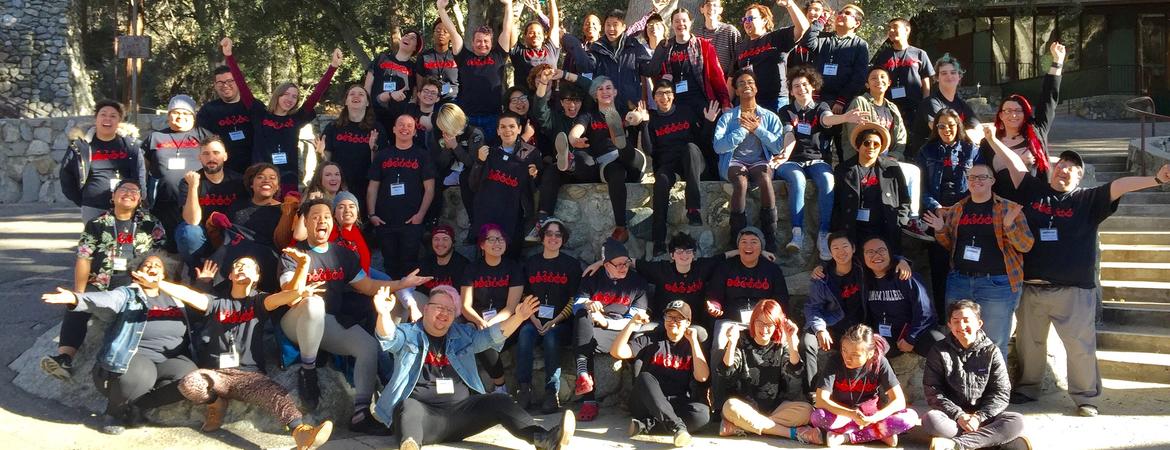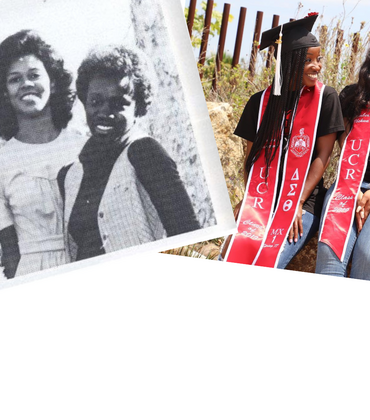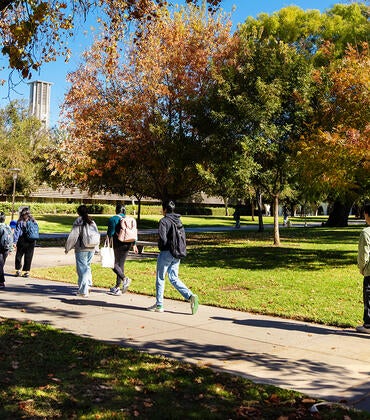
For Sy Simms, one of the more memorable stops on the road to living openly as a genderqueer person involved gathering the courage to come out to their fellow graduate-school peers. It was 2012, and Simms had just returned home from T*Camp, a pioneering, three-day retreat founded by seven Southern California colleges.
“T*Camp was the first time I’d ever been around a lot of other trans people,” said Simms, who prefers the pronouns they/them/their. “The weekend before I attended, I had been debating whether I was going to tell my graduate program I was trans; as soon as I got back from T*Camp, I sent the email the same night."
The retreat altered Simms’s course in more ways than one. They later left their previous graduate program to pursue a career in student affairs. After serving as a program coordinator in the LGBT Resource Center at the University of California, Riverside — one of T*Camp’s seven original organizers — and enrolling in a second graduate program, Simms landed at UC Santa Cruz, where they now work as the first trans education specialist in the university’s Lionel Cantú Queer Center.
Since their first T*Camp experience, Simms has attended five more times, including as a student facilitator and professional staff group leader. They join a pool of more than 350 former students from over 20 college campuses across Southern California who have benefited from the program.
In 2016, T*Camp grew so popular that its organizers split it into two retreats — one in Southern California and another, which Simms coordinates, in Northern California.
Nancy Jean Tubbs, director of UCR’s LGBT Resource Center, said T*Camp is the first program of its kind in the nation, although it was modeled after UC Irvine’s one-day TGQQ Retreat, held in spring 2011. In addition to UC Riverside, the Southern California camp’s founders and organizers include LGBTQ centers and providers at six regional campuses: Cal Poly Pomona, the Claremont Colleges, Chapman University, UC Irvine, UCLA, and UC San Diego.
“The goal is to provide a resource for isolated trans, genderqueer, and gender-questioning students who might not have access to spaces like LGBT resource centers on their college campuses, including community colleges,” Tubbs said of T*Camp. The retreat’s organizers, she added, receive more than 100 applications annually from college students interested in attending.
This winter, Southern California T*Camp will be held at Pilgrim Pines Camp in Yucaipa from Jan. 4-6, 2019. The online application period, which opened Oct. 1, will close Oct. 31.
“Before going to my first T*Camp, I had been very used to a strong lack of community,” Simms said. “To go to a retreat where 90 percent of the people in attendance were trans or genderqueer or gender-questioning made it so much easier to make friends and connections without the extra hurdle of having to come out to them.”
One of T*Camp’s most empowering aspects, Simms said, is how it places the onus on participants to set the standards for their experience. Upon arrival at the camp site, attendees meet to weigh in on a set of community agreements. Later, they break into smaller “home groups” of six to eight students, with each group co-facilitated by a returning T*Camper and a professional staffer.
Throughout the weekend, workshops and breakout sessions speak to a variety of themes. Some focus on the experiences of trans men or trans women, or on topics such as what it’s like to medically transition. Others appeal to students who identify as genderqueer, nonbinary, or gender-questioning, or those, like Simms, who want to engage around all aspects of their identities, not just gender.
“T*Camp was a space where I finally felt like none of my identities needed to be separated — I could be black, trans masculine, and genderqueer,” Simms said. “It was a place to talk about the intersection of blackness and queerness, in particular, which was something I’d never experienced.”
With a view toward life after T*Camp, participants also discuss strategies to navigate mental health issues, maximize personal wellness, and access key resources, including the guidance of other trans adults.
Tubbs said the program also benefits the professional staffers who help run T*Camp, many of whom work with LGBT students at their home campuses and leave with new techniques to better support those students.
The program’s success among both students and student-affairs professionals recently earned the attention of the organization NASPA, also known as Student Affairs Administrators in Higher Education. Last spring, the organization presented all seven of T*Camp’s co-founding campuses with one of its highest honors: a Grand Gold Excellence Award.
Going forward, Tubbs hopes the program will reach even more students. In Southern California, T*Camp costs $150 per participant, but the program’s organizers assist students with finding funding to cover the fee. At UCR, the LGBT Resource Center covers the cost for UCR students accepted to attend, but many students apply from college campuses without comparable funding sources. To help those students, the T*Camp Support Fund was launched in 2015.
For Simms, it’s a small price to pay for what could be a life-changing experience — or even a life-saving one.
“We have students who arrive at T*Camp rather shy and withdrawn, and by the end of camp, they’re talking with everyone,” Simms said. “But even beyond that, I’ve had students email me long after camp has ended to say, ‘Thank you for giving me to opportunity to go to T*Camp. I wasn’t sure if I was going to survive the next year, and T*Camp saved my life.’”
Click here to watch a documentary-style video made about T*Camp in 2016.



